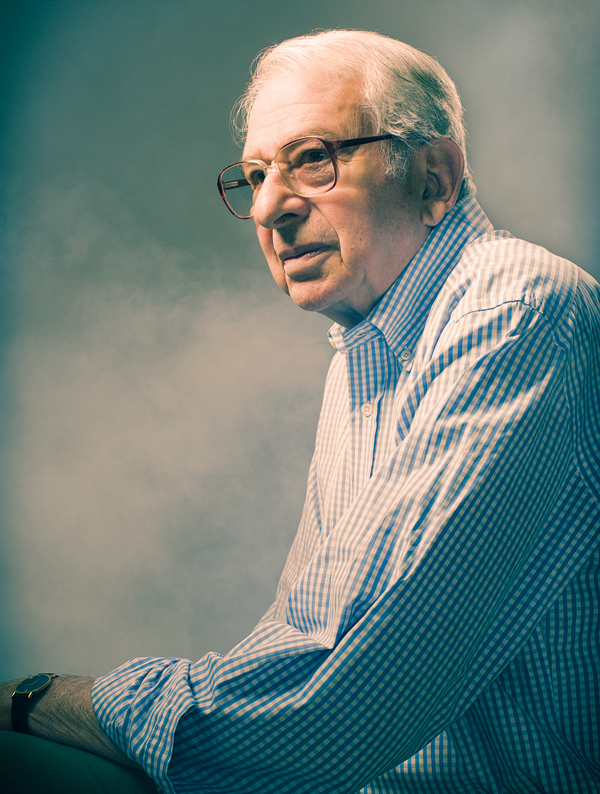Lost in the Weeds
“I am content that, ultimately, I have done more to relieve suffering than most of my colleagues.”—Lester Grinspoon, medical marijuana godfather and associate professor emeritus, Harvard Medical School

Photo by Scott M. Lacey
I’m sitting in the passenger seat of my friend’s car on Colfax Avenue, Denver’s neon-stripped main drag, and I’m freaking out. My friend has been inside the dispensary way too long, and I just know that something’s gone wrong. Maybe they figured out that he’s buying for someone else.
But then I see him walk out the door, with a brown paper lunch bag in his hand and a carefree look on his face. He gets into the car and tosses the bag to me. I look inside and see a couple of green pill bottles with a few grams of pot. Gray-market drug deals are as easy as that.
It took a few more trips to dispensaries before I unlearned the paranoia I’d picked up from a hundred or so street deals. It was 2010, and pot shops had become more numerous in Denver than coffee shops. Getting a Medical Marijuana Registry ID card was as simple as paying a doctor $200 and complaining of pain, so lots of healthy people, like my friend, ended up with access to legal pot. By 2012 nearly 100,000 Coloradans held the cards. I never applied for one—I was too afraid of ending up on a list that might come back to haunt me—but I didn’t have to, because my friend was willing to buy for me. So every few weeks, I’d hand over $30 and get an eighth of an ounce of top-shelf product. That was half of what I was used to paying, the quality was consistent, and I didn’t have to put up with any more shady dealers.
Buying from sketchy people is what I hated the most. In high school in Connecticut, when local dealers were dry, we’d head into the city. I once got caught in a messy brawl because one of the guys I was with owed the dealer’s friend some money. Fists flew, glass broke, and we ran out the door without our money or our weed. In college, a few guys I knew who were dealing pot got held up at gunpoint.
That violence undercut the reason I had started smoking pot in high school—it was an easy way to laugh and make friends. By college, marijuana had become an identity. I listened to jam bands, and my friends were my smoking buddies. But after I graduated, things changed. I had a girlfriend at the time, and though we didn’t get along that well, we stayed together. I’d say good night to her, go home and smoke a bowl, and the relationship would idle on. Pot became something I did to distract myself. We stayed together for an extra few months probably because I was high so often. That makes me wonder: Just how much time has marijuana cost me over the years?
It’s true that people at my stage of life tend to start asking themselves these kinds of questions. I’m 32 now, married and with a good job in the city, which means the stakes seem higher to me. And I’m not alone. Of people ages 30 to 34, 16 percent say they’ve smoked marijuana in the past year. Among those 35 to 39, it’s just 10 percent. But what happens when you suddenly have a card to buy marijuana anytime you want and can legally smoke weed? Massachusetts seems poised to find out.
Medical marijuana has been overwhelmingly popular with American voters since California put up the first citizens’ ballot, in 1996. In all, 17 states and the District of Columbia have legalized the drug for medicinal use, and only one, South Dakota, has voted down a medical-marijuana ballot initiative. Next month, people in Colorado, Oregon, and Washington will vote on whether to legalize (and tax) marijuana for any use—in direct violation of a federal ban that’s been in place since 1937. Polls in Colorado and Washington show support at more than 50 percent.
But just because medical-marijuana laws have been popular at the ballot box doesn’t mean there haven’t been problems enforcing them, or that there’s any kind of uniformity in how they’re written or applied. As I mentioned, you have all kinds of healthy people—like me—taking advantage of the system. Then you have the growers who use medical-marijuana laws as a cover to produce pot for illegal distribution. A two-year study in Colorado, for example, found 70 instances of state-regulated pot being diverted to drug traffickers in 23 states.
In California, meanwhile, the state has little to do with licenses or dispensaries, which has led to an unchecked proliferation of pot shops and to confusion among law enforcement officials when it comes to who is truly medicating and who is committing a crime. And then there’s the fact that in more than half of the states with medical-cannabis laws, marijuana has never been sold in a brick-and-mortar shop. In those places, the law doesn’t allow sick people to buy pot at a retail outlet. It simply protects them from arrest or prosecution for possession.
But here in Massachusetts, the medical-marijuana proponents believe they’ve found a better way to deliver the drug into the hands of those who need it, while keeping it away from those who don’t. I’m not sure that’s possible.